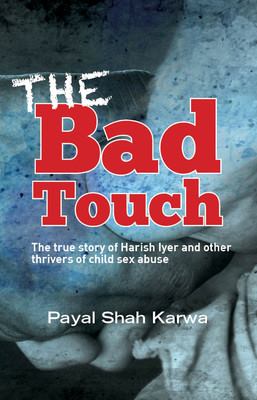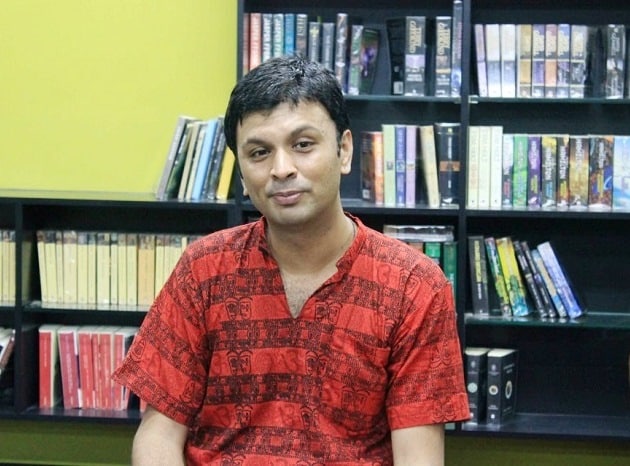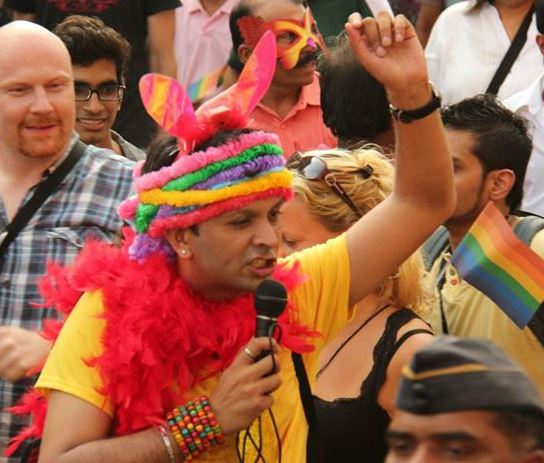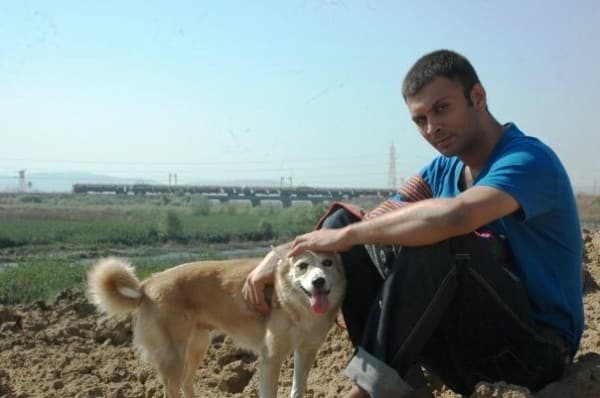He is the person you would see in the streets word-wrestling with someone pelting stones at a dog, or screaming his lungs out if he saw someone chop a tree in the pretext of pruning. He is also the person you would see sit in statue position at a park for hours actively being a sound board for someone ostracized or victimized and desperately in need of a pair of ears and a hug.
He would also be seen in police stations fighting to file cases of women harassment or child abuse or animal abuse or homosexual extortion. And when he is not doing any of these, he is busy at television studios, hogging the limelight, quite at home being the self-proclaimed media-whore.
Sipping coffee at a suburban restaurant, I caught up with the canny guy who, in complete contrast to the grassroot-level serious activism he takes up, is always in the joie-de-vivre mood. Here is a peek into the conversation with the breeze of enthusiasm and unapologetic narcissism that is Harrish Iyer.
There’s quite a bit on your platter. What drives you to take up these causes? Where does your activism take you?
Harrish Iyer: I think pain is a great propeller. Given my childhood abuse, I have lived many formative years in closets of shame. I guess, the intensity of desires and dreams were so high that I live an unabashed, unapologetic and unashamed life all through.
And well, my activism takes me places – not cozy and warm but sometimes to too dingy no-(hu)man land. But I would have it no other way.
Being gay and being a gay rights activist how do you handle criticism and stigma that the society at large gives you?
Harrish Iyer: India is full of couch activists and opinionated bigots. I don’t handle them, I let them be. Most people think that being gay is about men having sex with men. Well, guess by the same logic being straight should also be only about men and women having sex with each other. We all know that sexuality is much more than just rolling over the hay with someone you love – heterosexual, homosexual, bisexual – immaterial.
Some people think gay people have a lot of sex. I wonder how much time they spend with thoughts of naked men having sex with each other. Even we gay men don’t fantasize so much. I secretly wish that their assumption comes true one day. I wish we really got that lucky.
My sexuality is an integral part of me. But I am more than who I love and who I sleep with. I belong to a marginalized section of the society. When I speak about my rights, I am told that there are OTHER important issues. Given the political fever, I am told (and also told off) that Development is the issue India should be speaking about and that fighting for the right to love freely is not that important. With section 377, the state gets the right to peep into our bedrooms and tell us that we cannot make love. (The lesser known fact is that this law also tells heterosexual couples that they can’t have sex other than for the purpose of intended procreation – though yes, the law is tool to discriminate against gay men).
Has there been a significant change in the opinions and outlook of the Indian populace since you have begun your activism for LGBT rights? Who inspires you?
Harrish Iyer: I think Indians are growing up to accept genders beyond the binary of Male and Female. So is the case with sexuality. I think it is natural progression that we go back to our roots and accept sexuality as it was always accepted in Indian society.
Can I say without batting an eyelid that I am my own inspiration? But I can afford to say this freely because of the ground work of Ashok and The Humsafar Trust. Ashok spoke up at a time when it was not so easy. He truly is one person I look up to.
Tell us a bit about your activism for child rights and spreading awareness on sexual abuse in children. What prompted you to take this up? Has there been significant change in the manner parents in specific and the Indian populace as a whole?
Harrish Iyer: I think we all have a story of pathos and pain waiting to be told. I tell it. India has grown on the lap of grand-mothers and a ear full of grandma tales. I tell my story. I don’t curse the darkness, I show the world the way to light that I unearthed.
I speak to a lot of parents and to-be parents about my abuse. People do stand up and take notice. Some of course get into a denial mode and tell me that this doesn’t happen in their family. But generally people do understand.
Why is animal rights activism so close to your heart?
Harrish Iyer: I was helped by an animal, (my dog – Jimmy) to recover from my abuse as a child. No human helped me. I have time and again experienced that animals are more humane than humans. I am a proud parent to two cats, and I understand their needs. When they are hungry they just tell me. When I am sad, they just come to know. I am not doing a favour on animals by standing up for them. I am simply trying to return the favour of theirs in making my world a lovable place.
I am a strong advocate for Animal Rights and Vegetarianism. So much so that I believe that these issues are beyond debate. There is no justification for animal abuse for food, clothing or religion. Plants have feelings too, one may say, for the purpose of arguing a senseless debate. Yes they do, so it is important that we grow them and only ensure that we take from nature what is the need and nature bestows. For instance, a fruit shall fall from the tree. We don’t let it ripe and fall; we pluck it and use artificial ripeners. I don’t say that plants have no feelings. I speak to them every day, and I see them respond by growing prolifically.
But having said that I find it ridiculous to even compare killing of animals, (watching it crying and writhing in pain, dying a pitiable death, screaming, shouting and living to land up at a slaughter house full of bloodshed) – to a vegetable at a bhaji market. I think humans are the cruelest of all animals. It makes me feel that we should be extinct one day. We don’t deserve the compassion we are blessed with.
Let me ask you something pleasant. You have a book with a biographical account of your life – The Bad Touch and you have a National Award winning film – I AM and you have the very critically acclaimed AMEN based on your life. Tell us about it.. and also tell me … All at just 35?
Harrish Iyer: Haa! The Bad Touch, the most recent book by Payal Shah Karwa speaks about my life as a thriver of child sexual abuse. She is a close friend and an ex-colleague. She has worked really hard for this book that also includes stories from my friends Anurag Kashyap, Amrita amongst others. It is like a handbook that every parent should read.
Onir’s I AM started off as Abhimanyu, which was supposed to be a short film inspired by my life and my friend Ganesh Nallari’s. Later with Onir’s vision it grew as I AM, 4 stories of fractured lives but with an un-broken spirit. It speaks about male child sexual abuse, for the first time, so candidly on the canvas of Indian cinema.

Now, answering your second question about biographies at 35. Age is just a number. My life is beyond numbers. I am just lucky that I have people writing about me and making films on my life. (Not just two films, there are more to come in the next few years). But this doesn’t mean that I am the only one who has an inspirational life story. It only means that I am out there, loud-in-the-open and thus people have easy access to my life and my story.
Carrying placards and roaming around town, painting the town red and generally shocking people during your crusades. Does shock value work better for getting the point across? Give us some instances where shocking people has worked for you to sit up and take notice?
Harrish Iyer: I am sarcastic, (in a good way), by nature. And am unafraid of caustic comments and popping eyeballs. I love a little bit of tease in my life. Sometimes it backfires. I remember a day that I was strolling at phoenix mall in Mumbai with this queen-of-a-guy, a friend in an imaginary closet, to tease him I pushed him away and called him out aloud “Aye Homo”. There was an elderly Parsi woman who noticed and gave me a earful. She said, “You have no right to discriminate against gay people. You educated illiterate!”.
I tried explaining that I am gay myself and was playing a prank, she was in no mood to listen. It is one hilarious happy incident that left me pleasantly trapped in my own web.
You are listed as one of the 100 most influential LGBT people in the world along with Stephen Fry, Ellen De Generes, Ricky Martin? How does it feel?
Harrish Iyer: It feels great to be in the list. It feels a little awkward too. I don’t know how to react to the compliment.
Tell us more about United Way of Mumbai? How does it fit into what you stand for as an individual?
It is a fantastic organisation. I always wanted to use my skills in the NGO sector. I am glad we found each other. It is a love story that is in the making. I interact with a number of NGOs in my personal capacity, this is an extension of my personal life. So befitting.
*****
While the masses know Harrish Iyer as the man who dared to share his moving story of surviving years of sexual abuse on a talk show, the people whose lives he touches every day will vouch for one thing: This man is an institution in himself.
Connect with Harrish Iyer here.




